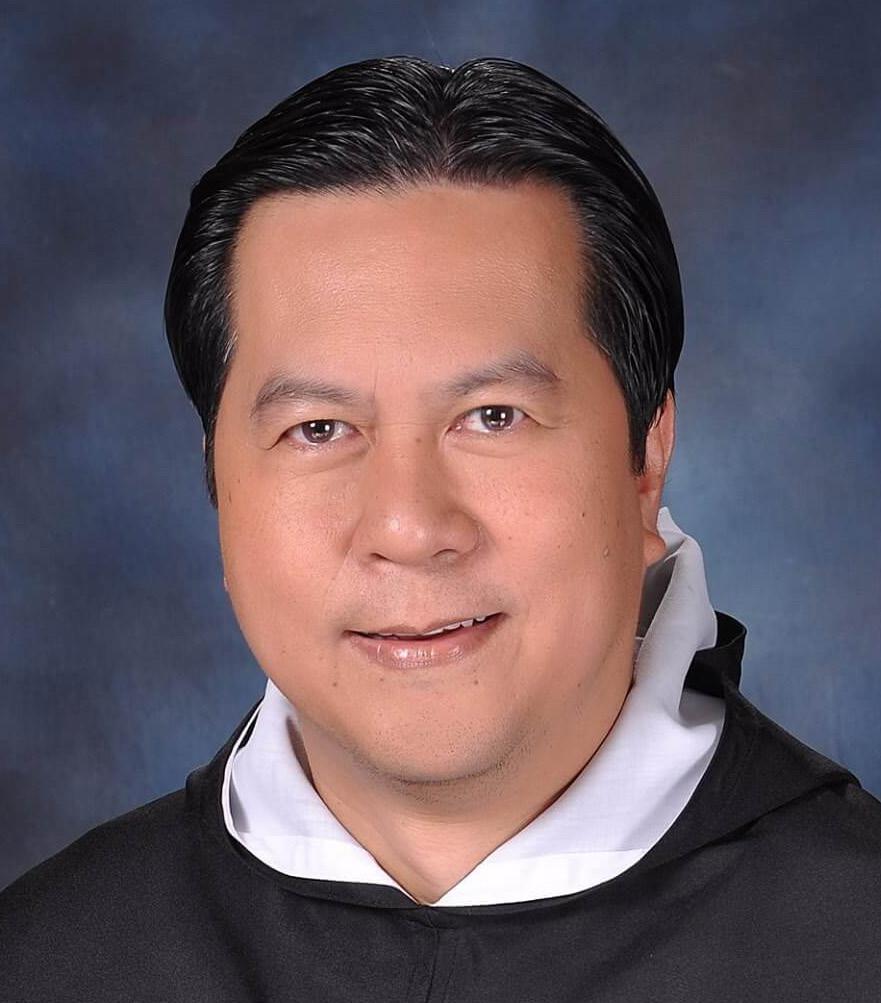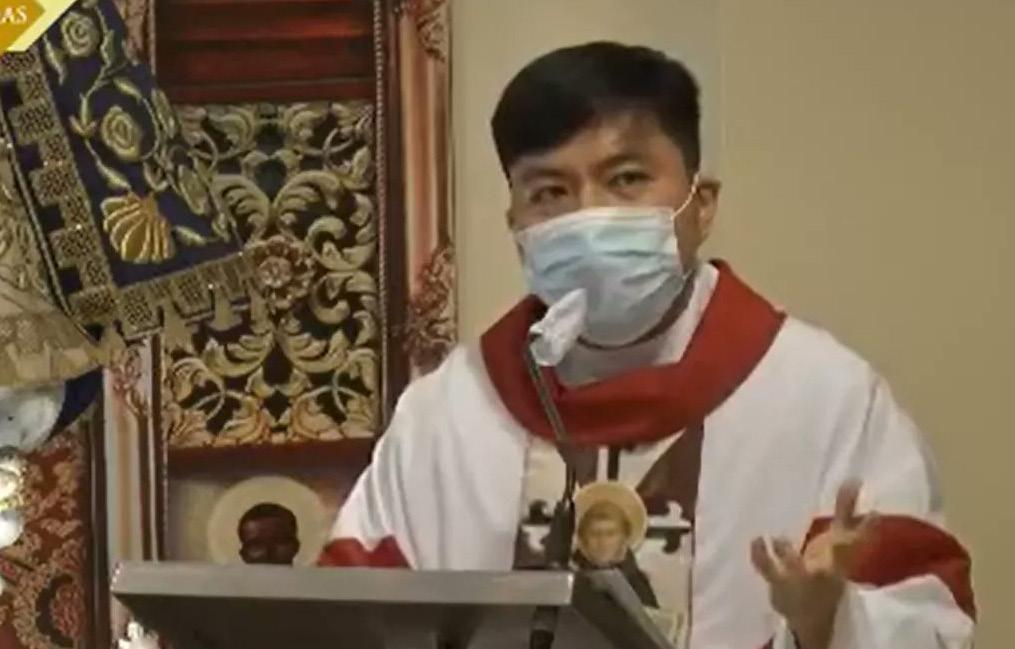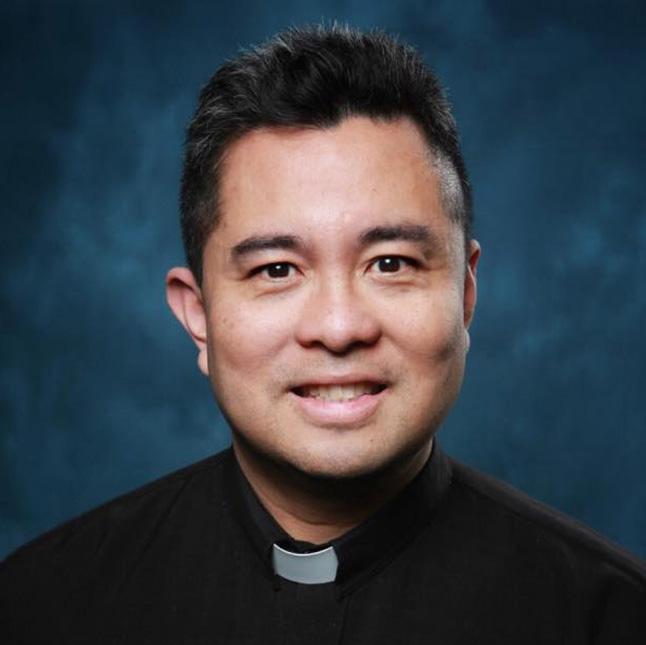
23 minute read
WITNESS
Ex-UST vice rector is new head of Filipino Dominicans
FORMER UST Vice Rector for Religious Affairs Fr. Filemon de la Cruz, Jr., O.P. has been elected as the 13th prior provincial of the Dominican Province of the Philippines.
Advertisement
The Master of the Order of Preachers, Fr. Gerard Francisco Timoner III, O.P., confirmed the election on Monday, Jan. 18.
De la Cruz was elected to his post on Sunday during the 12th Provincial Chapter held in Caleruega, Batangas . It was spearheaded by the Convent of Saint Albert the Great.
By virtue of his position, he will also serve as the University’s vice chancellor for four years, until 2025. He will also be chairman of the board of trustees.
De la Cruz succeeded Fr. Napoleon Sipalay, Jr., O.P., who was prior provincial from 2016 until de la Cruz’s appointment.
According to the Rule of St. Augustine and the Book of Constitutions and Ordinations, a prior provincial or superior of a province “must promote regular and apostolic life, provide for the brothers’ needs [and] should be concerned that the brothers fulfill their personal obligations.”
The newly elected Filipino Dominican head is a former director of UST Center for Campus Ministry and is teaching sacred theology at the University.
De la Cruz obtained his bachelor’s degree in philosophy at the Philippine Dominican Center of Institutional Studies in 1986.
Born in Manila, de la Cruz earned his canonical degree in sacred theology and his master’s degree in theology in UST in 1991 and 2006, respectively.
De la Cruz entered the Dominican pre-novitiate program in 1980 and professed in the Dominican Order on May 11, 1984. He was ordained priest in 1992.
Before he was elected, de la Cruz was assigned to San Lorenzo Ruiz and Companion Martyrs Parish in Navotas.
From 2017 to 2020, he served as the superior of the Dominican community of Rumah Santo Tomas in Surabaya, Indonesia.
He was also appointed head of the Dominican Clerical Fraternity (2012 to 2014), provincial councilor (2012 to 2016) and socius or assistant of the prior provincial
Fr. Filemon de la Cruz, O.P.
(PHOTO FROM OP.ORG)
(2014 to 2016). MA. ALENA O. CASTILLO AND SOPHIA T. SADANG
NAZARENE FEAST:
‘Amid pandemic, Jesus remains with us’
MANILA APOSTOLIC Administrator Bishop Broderick Pabillo exhorted Catholics to connect with Jesus amid their sufferings during the Covid-19 pandemic in a Eucharistic celebration for the feast of the Black Nazarene at the Quiapo Church on Jan. 9.
“We do not deny the sufferings that are with us, but put Jesus there. Ilagay si Hesus, at mata-transform po ang ating kahirapan at magiging kaligtasan (Put Jesus there and our sufferings will turn into salvation),” Pabillo said.
Pabillo reminded Nazareno devotees that Christ is one with the people in their problems as he discussed the theme, “Huwag kayong matakot, si Hesus ito!”
“Ang Poong Nazareno ay parang isang magnet … hindi lang tayo naa-attract sa kanyang pag-ibig, at hindi lang sa isang imahen, ngunit sa Diyos din na nakikiisa sa ating kalagayan na pasan ang krus,” he said.
The theme was derived from Matthew 14, where Jesus’ walking on water frightened his disciples. Jesus reassured them, saying, “Take courage! It is I. Don’t be afraid.”
In a previous interview, Msgr. Hernando Coronel, rector of the Minor Basilica of the Black Nazarene, reminded Catholics to remain faithful to the Lord amid the Covid-19 pandemic.
“Ang ating Panginoong Hesukristo ay sinasamahan tayo sa ating paglalakbay sa ating pagsubok. Hindi naman niya tinatanggal ang kahirapan o problema, kasama natin sa paglalakbay. Kaya kumapit tayo, magtiwala tayo, umasa tayo,” he told the Varsitarian.

Traslacion’s new normal
Pabillo said the pandemic changed the way traditions were being celebrated, but more people became nearer to Christ.
The Covid-19 crisis caused the grand procession to be canceled, but Manila Police Chief Brig. Gen. Leo Francisco reported that at least 400,000 devotees had flocked to the vicinity of Quiapo Church on Jan. 9.
Localized celebrations were also observed, where a replica of the Black Nazarene was brought to different areas around Metro Manila and nearby cities from Dec. 31 to Jan. 7.
Novena Masses were also held from Dec. 31 to Jan. 9 and the traditional pahalik of the image of the Black Nazarene was replaced by a patanaw (viewing) from the balcony of Quiapo church and in Plaza Miranda.
A total of 15 Masses were celebrated for Nazareno’s feast. Only 400 churchgoers were allowed to enter the Quiapo Church for each of the 15 Masses, allowing a total of 6,000 devotees to attend the Eucharistic celebrations in-person.
The mesquite wood image of the Black Nazarene depicts Jesus Christ kneeling while carrying the cross.
The image of the Black Nazarene was partially destroyed during the Battle of Manila in 1945. S. T. SADANG WITH FEAST OF ST. THOMAS AQUINAS:

SUCCESS will follow if we prioritize God and work on building our faith.
This was the message of Fr. Rudolf Steven Seño, O.P. of the UST Ecclesiastical Faculty of Philosophy during the University Mass for the solemnity of St. Thomas Aquinas, UST’s patron saint, on Wednesday, Jan. 27, at the St. Dominic de Guzman Chapel.
“Our mission is not to be successful; rather, it is to be faithful. If you are faithful, if and only then, success will follow. Be like Aquinas and put things in order. We should focus on more important things: Prioritize God, seek Him” he said.
In his greatest work Summa Theologica, Aquinas tackled the proofs of God’s existence, man’s ultimate purpose, faith and morality.
Aquinas wrote that the pursuit of knowledge and truth could only be found in God.
Seña also urged Thomasians to develop traits like faith and wisdom amid the pandemic and not merely become health- and wealth-conscious individuals.
“Ngayong may pandemic, we are becoming health and wealth conscious. Aanhin mo ang mga milyon-milyon o bilyon-bilyong pera kung sa huli ay magkakasakit ka? It should not stop from there,” he said. (In this time of pandemic, we are becoming health and wealth-conscious. What will you do with millions or billions of money if you will only get sick in the end? Our efforts should not stop there.)
Seño led the Triduum Masses from Jan. 25 to 27 in preparation for the feast, which had the theme, “A Mind to Know You, A Heart to Seek You, Wisdom to Find You.”
During the first and second Triduum Masses, Seño called on Thomasians to have a heart like St. Thomas,’ who both loved and contemplated..
“We can have a mind that is not just thinking but also loving and concerned with the welfare of others and strives to make itself understood. It could only be possible if our mind is closely connected with the heart,” he said.
The new normal brought about by the Covid-19 pandemic warrants reinforced faith such as that of St. Thomas, Assoc. Prof. Allan Basas, faculty secretary of the Institute of Religion, told the Varsitarian.
“In the midst of all chaos, confusions, crises, pluralities, subjectivism and relativism… St. Thomas dared to meet the changes and challenges of his

Fr. Rudolf Steven Seño, O.P. delivers the homily for the University Mass for the solemnity of St. Thomas Aquinas.
(PHOTO FROM SANTÍSIMO ROSARIO PARISH - UST/ FACEBOOK)
times by being faithful,” Basas told the Varsitarian.
“St. Thomas is a shining example of a Catholic scholar who has dedicated himself to the service of the contemplation and transmission of the absolute truth, the effective communication of the truths of the faith as the fruit of his sedulous contemplation; the analysis… of the propositions of his allies and objectors alike, as a way to expose and propagate the faith; [and] the life-long learning of the truths of the faith by ensuring anchorage on the sacred traditions and being open to dialogue with new realities of his time,” Basas said.
Fr. Lester Mendosa, a doctorate student from the UST Faculty of Canon Law, urged seminary students to emulate St. Thomas’ passion in truth-seeking and truth-telling in his homily
M.AO. CASTILLO AND S.T. SADANG


NEW YEAR HANGOVER ATHEA MONIQUE Z. GALA

ROUND 2 RAE ISOBEL N. TYAPON

HOW TO KEEP YOURSELF SANE FOR NEXT SEM CATHERINE PAULENE A. UMALI

Vaccination
FROM PAGE 1 Austriaco attributed the rapid development of vaccines to “decades of experiments and countless sleepless nights by tens of thousands of scientists who spent hours and hours toiling at the bench from the bedrock of the vaccines that are now being deployed around the world.”
“A lot of great science went into these vaccines and a lot of great scientists were needed to generate that great science,” he said.
Despite limited and accelerated vaccine tests and trials, Austriaco said enough proof was produced to conclude that the vaccines were effective.
“In the end, the numbers say it all. And what the numbers say is that these vaccines are safe and efficacious. Tens of thousands were tested and they developed an appropriate immune response to the SARS-CoV2 virus. Tens of thousands were tested and none got very ill or died from the vaccines,” he said.

Fr. Nicanor Austriaco, O.P.
(PHOTO FROM CBHD.ORG)
On side effects
Austriaco said the vaccines would “absolutely” cause side effects—not because they’re ineffective, but because they’re working.
“I expect to have a sore arm for a day or so. I expect to have a fever and to feel worn out for a time. But these are signs that the vaccine is working! These are signs that the vaccine is jumpstarting my immune response so that I can make those precious antibodies that will wipe out the Covid-19 virus if I am exposed to them for real in the future,” he explained.
Austriaco said there was no need for people with allergies to panic should the vaccines induce severe allergic reactions, like what was seen in 21 of the first 1,893,360 Americans who were given the vaccines.
“Here in the Philippines, we plan to have [epinephrine auto-injectors] available everywhere we do vaccinations. So we will be ready. If I or someone else gets an allergic response, we will jab them with that,” he said.
The Dominican also assured that there was no proof that the vaccines could be causally associated with post-vaccination deaths.
Austriaco stressed that the vaccine would not cause infertility nor reprogram human DNA.
“[These claims are] unreasonable and not supported by any science… As a priest-scientist, I have to respect the evidence, whether it is the data of science or the data of divine revelation, and there simply is no evidence that mRNA (messenger RNA) vaccines will reprogram our genes,” he said.
Some of the first Covid-19 vaccines to be approved for use in other countries make use of the mRNA technology. This technology teaches cells how to make protein that triggers an immune response and produces antibodies.
‘Immoral’ vaccines
Some vaccines were made with fetal cells derived from a decades-old abortion.
Austriaco admitted that these may cause hesitancy among Christians, but said the Vatican itself had noted that it would not be immoral to avail oneself of “morally controversial” vaccines, especially if no other options are available.
“In the end, I believe that the unprecedented, and really, unexpected, successes we have witnessed in the production of these vaccines are a blessing from the Lord,” he said.
“If you had told me back during the first lockdown that we would have a handful of safe and efficacious vaccines ready to go within the first year of the pandemic, I would have shaken my head in disbelief,” he added.
According to vaccine czar Carlito Galvez Jr., the government aims to vaccinate 50 to 70 million Filipinos this year.
Pfizer, AstraZeneca and Sinovac vaccines to date are the only Covid-19 vaccine approved for emergency use authorization in
Consult with experts
FROM PAGE 6 The team also used a conductivity-temperature-depth (CTD) profiler—a tube-like device with sensors submerged in water—to get vertical profiles of the temperature, conductivity and pH levels of the lake weeks after the eruption. However, their sampling equipment got damaged.
“Nagleak yung batteries when we deployed our [CTD profiler] to around 40 meters depth, which hasn’t happened before in any of the other lakes we visited before or in Lake Taal nung una naming trip,” Papa said.
Upon consultation with geologists from UP, the UST researchers deduced that the eruption might have caused changes in water quality and pressure which their sampler could not withstand.
The “Agham ng Bulkang Taal” program aims to promote island conservancy and provide solutions to improve lake biodiversity as well as the livelihood of lakeshore communities.
In a previous interview with the Varsitarian, Papa said that the Taal eruption should serve as a wake-up call for proper conservation and management of the lake.
Joining Papa in the aquatic biology team are Thomasian scientists Jonathan Briones, Dino Tordesillas and Elfritzson Peralta, together with Asst. Prof. Francis Magbanua from UP Diliman.
The same team will also embark this year on the UST-led Taal Post Eruption Ecological Research (Peer) Program funded by the National Research Council of the Philippines to conduct further research work on

College of Science Dean Rey Donne Papa
(PHOTO FROM UST WEBSITE)
Taal as of December 2020 (Photo courtesy of Mr. Elfritzson Peralta) Lake Taal. CAITLIN DAYNE A. CONTRERAS WITH REPORTS FROM MIGUEL LOUIS M. GALANG
PNP
FROM PAGE 5 It’s true: the law is the law. The law of the land applies to all and there should be no exceptions. Rules and regulations are set to maintain order, justice, and equality in society. But what can we do when those tasked to enforce the law, the land’s “peacekeepers” themselves are disregarding it?
This is the sad reality of this country—the system is unfair and those in uniforms are helping foster the culture of impunity. The over-abused power dynamics are exercised over and over again by people in position, trampling upon common Filipinos’ rights and taking their lives.
Empty promises of internal cleansing have been sworn to the public by police chiefs since way back when, but time and time again the abuses by the cops seem to be getting worse. Even with evidence publicized, these power-trippers show no remorse and no guilt. Even PNP Chief Debold Sinas had the gall to discourage civilians from recording police forces who abuse their positions, claiming it could be dangerous.
In the case of the recently controversial death of flight attendant Christine Dacera, Sinas was encouraging a disregard of proper procedures and called for the turnover of the suspects without a warrant—even declaring the case closed without sufficient evidence.
This, along with many other blunders, makes one think about who the force is really protecting. The PNP’s motto is “to serve and protect,” but it seems as if they are only protecting themselves and their culture of impunity? It gets clearer day after day that Filipinos are playing a losing game.
A leadership overhaul in the PNP is long overdue. Filipinos do not have to die at the hands of their “protectors.” It would help a lot, too, if we do not have a madman as a president who orders his boys to shoot anyone dead as he pleases.
Editorial
FROM PAGE 5 Bolaños and the SHS educators may not have comprehended well the statement that UST Acting Rector Fr. Isaias Tiongco, O.P. and the other schools’ heads have signed, so we cite here important excerpts:
“We assert that … as Philippine schools, we value the Filipinos’ basic Constitutional rights to free speech, thought, assembly, and organization. As universities with high aspirations for the country, we seek to direct our students to engage in acts that contribute to the strengthening of social conditions, defend the country’s democratic institutions, and promote nation-building. And as institutions of higher learning that are stewards of the repositories and producers of knowledge, and builders of communities, we must retain our independence and autonomy from the State and other institutions.
“We therefore object to General Parlade’s statement and emphasize that our institutions neither promote nor condone activities of the New People’s Army and, indeed, of any movement that aims to violently overthrow the government.
We have italicized key parts of the statement in order to guide Bolaños and the SHS in their examination of conscience, if any.

Arrogant bureaucratic overreach
Not only have Bolaños and the SHS administration committed student-union busting. It has even barred Ampatuan from “readmission” next academic year, which means he cannot enter college in UST. This is arrogant bureaucratic overreach because the SHS has no power over the UST Office for Admissions. Definitely it has no power to deny Ampatuan his right to have a college education.
But bloodthirsty and drunk with power, SHS even told Ampatuan he would not be given a certificate of good moral character, a requisite in college admissions, the better to ensure he’s denied his human right to higher education. What the SHS has done is vicious and inhumane.
We call on Bolaños and the SHS administration to rescind their order sanctioning Ampatuan and their show-cause letters to other students. We call on them to stop the witchhunt. Their anti-democratic and unchristian actions are anathema to UST, especially in light of the University’s responsibility to “promote learning and safeguard the rights of the young,” as the Jan. 24 statement declares. The bureaucratic overreach is not only an infringement on Ampatuan’s “Constitutional rights of speech, thought, assembly and organization,” but is also a step away from the “sacred trust” that UST and the other signatory-schools have upheld.
Peaceful assemblies of a political character have always been permitted on campus—some even supported by the Central Student Council itself—and protest actions online. It’s unfair and disgraceful, especially in the middle of a pandemic, to raise the communist bogey and make students suffer the red-baiting of the military and become the scapegoats of the AFP’s failure to quell any insurgency in the country—communist or Muslim secessionist—failures that should be really attributed more to the AFP’s historic incompetence, mismanagement and corruption. UST simply cannot close the door on somebody who could as well be just looking for a place to belong and be relevant. At the least SHS has a moral and academic responsibility to its students drawn to activism. That responsibility is part of UST’s avowed “sacred trust.”
It doesn’t help that the engagements by and between government agencies and academic institutions—including UST—have to happen in the media as if publicity and sensationalism can replace real dialogue. It won’t hurt academic independence and autonomy and institutional egos if military and police and school heads communicate with each other and sit down together to hold a dialogue. What’s wrong with working together? There has got to be trust, no matter what, or nothing can move forward.
Even as there should be a sincere and proactive involvement among various sectors in promoting peace and order, efforts along this path must manifest fairness and respect for human rights. There’s simply no room for shortcuts or witch-hunts.
ART BY ATHEA MONIQUE Z. GALA
Harry Roque
defended the government’s illegal move. He was adamant that the soldiers violated no laws, saying those who distributed the vaccines should be the ones held accountable instead and not the ones who had received them.
It was both shocking and unsurprising how this lawyer justified crime on national television.
But that was not the first time Roque turned away from his past self’s righteousness.
Last year, Roque became subject of social media backlash after defending Duterte’s grant of absolute pardon to US Marine Lance Corporal Joseph Scott Pemberton Pemberton, who was convicted for killing Filipino transgender woman Jennifer Laude. Roque was counsel for the Laude family during the legal proceedings of the case from 2014 to 2016, but when Duterte let the American murderer off the hook, Roque immediately switched sides. Four days before Duterte granted Pemberton the pardon, the spokesman denounced the court order issuing the release of the American, saying it was an instance of “judicial overreach” that was “symbolic of the death of the Philippines’ sovereignty.” Roque would then contradict himself, defending Duterte’s grant of absolute pardon as saying: “Hindi na po kinakailangan bigyan ng dahilan ng president iyan.” In 2018, Roque said being presidential spokesman meant that he would no longer have the space to voice his personal opinions out, and it now shows. It seems that he has sold his soul to the devil in Malacañang. There are too many examples to cite, but here are some Google search keywords to remind you of Roque’s many controversies the past year: “Triciah Terada tirade”; “Pinky Webb hairflip”; “We beat the UP prediction… Congratulations, Philippines!”; “Hindi naman po pupuwede na pihikan dahil napakaraming Pilipino na dapat turukan.”
To be fair, Roque is very good at his job. He’s a quick-witted spokesman with an unquestionable background. He is more than capable of deflecting the public attention away from the president’s mess. But that does not remove the fact that Roque is a fool—a professional fool and an actual fool for turning back on his moral principles to stand by Duterte, whom he had advocated against in the past for being a “self-professed murderer” comparable to Hitler and Marcos.
Duterte’s presidency is nearly over and so are Roque’s opportunities to “leap, whistle and fart.” Roque should realize that the circus will only stay in town for so long; he has to decide whether he wants to be remembered as a comedian or the joker in the pack.
FROM PAGE 12 Entering the pros, Hortizuela said that he needs to tweak his playstyle and adapt to the international level where he said that teamwork is a bigger determinant in winning games than individual skill.
Hortizuela, an information systems sophomore, also bared that he filed a leave of absence from the Institute of Information and Computing Sciences with the permission of his parents to pursue his Liyab stint.
Liyab recently underwent a roster revamp, now bolstering an all-Filipino lineup that will debut in the Pacific Championship Series (PCS) 2021 Spring.
Hortizuela was among the new recruits by the professional team which finished ninth in the PCS 2020 Summer.
“Before Cresho made into the Liyab esports LOL lineup, he already had the mechanics and some experience in the tournament in the league. He is very
Ex-Teletiger
vocal inside the game and that’s one main reason why he got the role,” Coach Gerald “Tgee” Gianne Gelacio told the Varsitarian.
“Right now he needs more experience and macro mechanics. This will be a great opportunity for him to be a better player in the league,” Gelacio added.
With the new all-Filipino lineup, Liyab aims to reach the LOL Worlds Championship this year.
Pfizer vaccine
FROM PAGE 6 AstraZeneca vaccines were found to have a 70-percent efficacy rate based on interim data. They were approved for emergency use in the country last Jan. 28.
Last Nov. 27, the country purchased 2.6 million doses of the AstraZeneca Covid-19 vaccine via a tripartite agreement with the private sector for delivery in June 2021.
The Sinovac vaccine from China, which the country is looking to procure 25 million doses of by March 2021, is priced at P3,629.50 for two doses, the second most expensive vaccine based on Senate data.
Several lawmakers have raised concerns about the 50-percent efficacy rate of Sinovac with Sen. Juan Miguel Zubiri calling the Chinese vaccine “a joke” in the fight against the coronavirus.
Abrantes urged health authorities to prioritize Covid-19 vaccines that are cheaper and with better efficacy rates.
“You don’t argue about the political implications of [the Covid-19 vaccines], but just by looking, common sense will tell you that you have to go for the much more effective vaccines at [lower prices],” he said. challenge, so the country should also look into procuring single-dose vaccines such as the one from Janssen Pharmaceutica, Abrantes said.
“Two doses are already a bit difficult for Filipinos, you know our countrymen, we are very pasaway. I think we should as much as possible choose a [single-dose vaccine], that would be better,” he said.
Only Pfizer, AstraZeneca and Sinovac vaccines have been approved for emergency use in the country to date.
Janssen Pharmaceutica, Clover Pharmaceuticals, and Sinovac have been cleared by the country’s FDA to conduct clini-
Panic
FROM PAGE 6 “Based on the latest data regarding the variants, the UK variant particularly is more transmissible but less deadly. The mode of transmission is still the same. The minimum health standards and protocols will still apply,” he added.
Flores also advised the public to boost their immune systems by eating healthy food and exercising regularly.
Why and how do viruses mutate?
The emergence of these new SARS-CoV-2 variants is a result of virus mutations.
Asst. Prof. Jose Francis Abrantes from the UST Department of Biological Sciences said that viruses undergo mutations as they recognize changes happening within their environment.
“Mutations happen spontaneously in nature. So, the purpose of mutation actually goes into one very important point—survival,” Abrantes, a microbiologist, told the Varsitarian.
There is a stable occurrence of mutations in all coronavirus families, but human activity cannot induce nor worsen these mutations as it depends on the microorganism’s nature, he added.
Scientists are also monitoring these new variants and whether they can affect the efficacy rates of Covid-19 vaccines.
Researchers from Pfizer and the University of Texas Medical Branch at Galveston have found the Pfizer-BioNTech Covid-19 vaccine to be effective in targeting the common mutation found in the UK and South Africa variants. KATHERINE
ANNE L. ESCARILLA
Pacucoa
FROM PAGE 1 UST recorded the highest number of Level 4 re-accredited programs and candidate programs in the Philippines. It was also cited for having the first Level 3 re-accredited BS Entrepreneurship program in the National Capital Region.
Vice Rector for Academic Affairs Prof. Cheryl Peralta said the 10-year sweep was due to the efforts of all academic and support units, including the library, student services and administration.
“Collaborative work towards enhancing our strengths and addressing our weaknesses help us elevate our programs to greater heights,” Peralta told the Varsitarian.
Of the 48 accredited programs, 27 have a Level 4 accreditation, the highest in the five-level accreditation system of Pacucoa. Twelve programs were granted Level 3 accreditation.
Accreditation is a quality assurance process that checks whether a school complies with educational standards.
Criteria for accreditation include teaching and learning outcomes, research productivity, community service, linkages and consortia, career planning and student development, and planning process.
Peralta said the shift to remote instruction and work arrangements were not considered as the awards were based on the status of the programs before the pandemic.
Pacucoa has shifted to remote virtual accreditation. The College of Nursing has undergone the Level 4 reaccreditation process, whose results are expected to be out on Dec.


